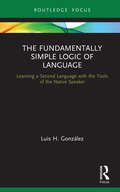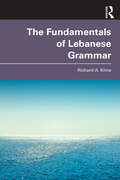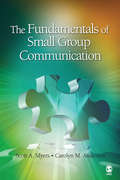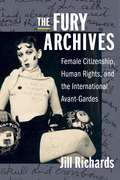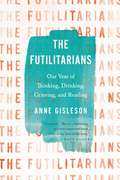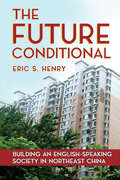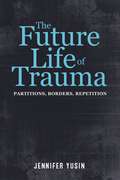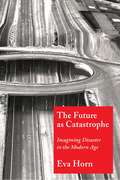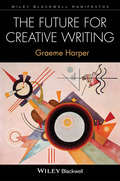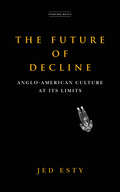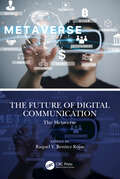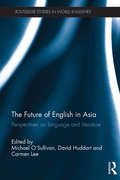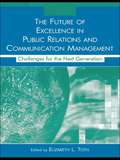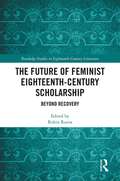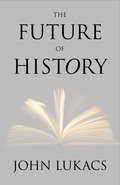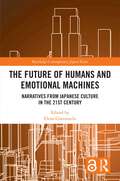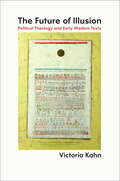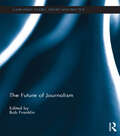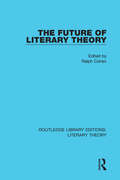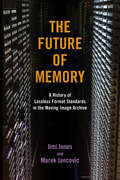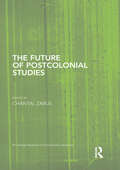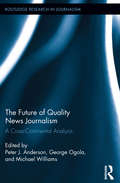- Table View
- List View
The Fundamentally Simple Logic of Language: Learning a Second Language with the Tools of the Native Speaker
by Luis H. GonzálezThe Fundamentally Simple Logic of Language: Learning a Second Language with the Tools of the Native Speaker presents a data-driven approach to understanding how native speakers do not use subject and direct object to process language. Native speakers know who does what in a sentence by applying intuitively two simple inferences that are argued to be part of universal grammar. The book explains and exemplifies these two inferences throughout. These two inferences explain the native speaker’s ease of acquisition and use, and answer difficult questions for linguistics (transitivity, case, semantic roles) in such a way that undergraduate students and second language learners can understand these concepts and apply them to their own language acquisition. While Spanish is used as the primary example, the theory can be applied to many other languages. This book will appeal to teachers and learners of any second language, as well as linguists interested in second language acquisition, in second language teaching, and in argument structure.
The Fundamentals of Lebanese Grammar
by Richard A. KlineThe Fundamentals of Lebanese Grammar provides a comprehensive guide to the grammar of the spoken language of Lebanon. It presents the fundamentals and complexities of the Lebanese variety of Arabic in a practical and organized way. This guide also utilizes side-by-side transliterations in both the Arabic script and the Latin alphabet in the way that they are used by native speakers. The explanations of the grammar concepts are presented in English and are made to be easily understandable for everyone, regardless of prior linguistic knowledge. Special features of this text include endnotes on culture, expressions, and an entire chapter dedicated to regional varieties of Lebanese. This book is an essential tool for all learners of the Lebanese variety of Arabic, and it is a useful resource for every stage of the language learning process, from beginner to advanced.
The Fundamentals of Small Group Communication: Myers: The Fundamentals Of Small Group Communication + Sunwolf: Peer Groups
by Scott A. Myers Carolyn M. AndersonThe Fundamentals of Small Group Communication provides readers with the fundamentals they need to become functional and productive members of any small group. Readers are introduced to the fundamental issues faced by all small groups (such as socialization, development, ethics, diversity) and the procedures utilized by effective small groups (for example, task accomplishment, decision making, climate). With a focus on the individual group member, this textbook encourages readers to reflect on how their communication behaviors (e.g., communication traits, verbal and nonverbal communication, listening style) and practices (e.g., their leadership style, their conflict management style) contribute to their current small group experiences.
The Fundamentals of Small Group Communication: Myers: The Fundamentals Of Small Group Communication + Sunwolf: Peer Groups
by Scott A. Myers Carolyn M. AndersonThe Fundamentals of Small Group Communication provides readers with the fundamentals they need to become functional and productive members of any small group. Readers are introduced to the fundamental issues faced by all small groups (such as socialization, development, ethics, diversity) and the procedures utilized by effective small groups (for example, task accomplishment, decision making, climate). With a focus on the individual group member, this textbook encourages readers to reflect on how their communication behaviors (e.g., communication traits, verbal and nonverbal communication, listening style) and practices (e.g., their leadership style, their conflict management style) contribute to their current small group experiences.
The Furry Animal Alphabet Book (Jerry Pallotta's Alphabet Books)
by Jerry PallottaThis fact-filled text with richly-detailed illustrations introduces not only the alphabet but also the wonders of the mammal world.What mammal jumps ten feet high to avoid hungry lions?What monkey almost always gives birth to twins?What mammal has a nose so large that it has to be moved out the way just to eat?What mammal has eyes that are bigger than its brain?Jerry Pallotta and Edgar Stewart deliver an intriguing book which will fascinate young children.
The Fury Archives: Female Citizenship, Human Rights, and the International Avant-Gardes (Modernist Latitudes)
by Jill RichardsIn the late nineteenth and early twentieth centuries, radical women’s movements and the avant-gardes were often in contact with one another, brought together through the socialist internationals. Jill Richards argues that these movements were not just socially linked but also deeply interconnected. Each offered the other an experimental language that could move beyond the nation-state’s rights of man and citizen, suggesting an alternative conceptual vocabulary for women’s rights.Rather than focus on the demand for the vote, The Fury Archives turns to the daily practices and social worlds of feminist action. It offers an alternative history of women’s rights, practiced by female arsonists, suffragette rioters, industrial saboteurs, self-named terrorists, lesbian criminals, and queer resistance cells. Richards also examines the criminal proceedings that emerged in the wake of women’s actions, tracing the way that citizen and human emerged as linked categories for women on the fringes of an international campaign for suffrage.Recovering a transatlantic print archive, Richards brings together a wide range of activists and artists, including Lumina Sophie, Ina Césaire, Rosa Luxemburg, Rebecca West, Angelina Weld Grimké, Elizabeth Gurley Flynn, Hannah Höch, Claude Cahun, Paulette Nardal, and Leonora Carrington. An expansive and methodologically innovative book, The Fury Archives argues that the relationship of women’s rights movements and the avant-gardes offers a radical alternative to liberal discourses of human rights in formation at the same historical moment.
The Futilitarians: Our Year of Thinking, Drinking, Grieving, and Reading
by Anne GislesonRecommended Summer Reading -- Louise Erdrich, New York TimesA memoir of friendship and literature chronicling a search for meaning and comfort in great books, and a beautiful path out of griefAnne Gisleson had lost her twin sisters, had been forced to flee her home during Hurricane Katrina, and had witnessed cancer take her beloved father. Before she met her husband, Brad, he had suffered his own trauma, losing his partner and the mother of his son to cancer in her young thirties. "How do we keep moving forward," Anne asks, "amid all this loss and threat?" The answer: "We do it together." Anne and Brad, in the midst of forging their happiness, found that their friends had been suffering their own losses and crises as well: loved ones gone, rocky marriages, tricky childrearing, jobs lost or gained, financial insecurities or unexpected windfalls. Together these resilient New Orleanians formed what they called the Existential Crisis Reading Group, jokingly dubbed "The Futilitarians." From Epicurus to Tolstoy, from Cheever to Amis to Lispector, each month they read and talked about identity, parenting, love, mortality, and life in post-Katrina New Orleans, gatherings that increasingly fortified Anne and helped her blaze a trail out of her well-worn grief. Written with wisdom, soul, and a playful sense of humor, The Futilitarians is a guide to living curiously and fully, and a testament to the way that even from the toughest soil of sorrow, beauty and wonder can bloom.
The Future Conditional: Building an English-Speaking Society in Northeast China
by Eric S. HenryIn The Future Conditional, Eric S. Henry brings twelve-years of expertise and research to offer a nuanced discussion of the globalization of the English language and the widespread effects it has had on Shenyang, the capital and largest city of China's northeast Liaoning Province. Adopting an ethnographic and linguistic perspective, Henry considers the personal connotations that English, has for Chinese people, beyond its role in the education system. Through research on how English is spoken, taught, and studied in China, Henry considers what the language itself means to Chinese speakers. How and why, he asks, has English become so deeply fascinating in contemporary China, simultaneously existing as a source of desire and anxiety? The answer, he suggests, is that English-speaking Chinese consider themselves distinctly separate from those who do not speak the language, the result of a cultural assumption that speaking English makes a person modern. Seeing language as a study that goes beyond the classroom, The Future Conditional assesses the emerging viewpoint that, for many citizens, speaking English in China has become a cultural need—and, more immediately, a realization of one's future.
The Future Life of Trauma: Partitions, Borders, Repetition
by Jennifer YusinThe Future Life of Trauma elaborates a transformation in the concepts of trauma and event by situating a groundbreaking encounter between psychoanalytic and postcolonial discourse. Proceeding from the formation of psychical life as presented in the Freudian metapsychology, it thinks anew the relation between temporality and traumatized subjectivity, demonstrating how the psychic event, as a traumatic event, is a material reality that alters the character of the structure of repetition.By examining the role of borders in the history of the 1947 partition of British India and the politics of memorialization in postgenocide Rwanda, The Future Life of Trauma brings to light the implications of trauma as a material event in contemporary nation-formation, sovereignty, and geopolitical violence. In showing how the form of the psyche changes in the encounter, it presents a challenge to the category of difference in the condition of identity, resulting in the formation of a concept of life that elaborates a new relation to destruction and finitude by asserting its power to transform itself.
The Future as Catastrophe: Imagining Disaster in the Modern Age
by Eva HornWhy do we have the constant feeling that disaster is looming? Beyond the images of atomic apocalypse that have haunted us for decades, we are dazzled now by an array of possible catastrophe scenarios: climate change, financial crises, environmental disasters, technological meltdowns—perennial subjects of literature, film, popular culture, and political debate. Is this preoccupation with catastrophe questionable alarmism or complacent passivity? Or are there certain truths that can be revealed only in apocalypse?In The Future as Catastrophe, Eva Horn offers a novel critique of the modern fascination with disaster, which she treats as a symptom of our relationship to the future. Analyzing the catastrophic imaginary from its cultural and historical roots in Romanticism and the figure of the Last Man, through the narratives of climatic cataclysm and the Cold War’s apocalyptic sublime, to the contemporary popularity of disaster fiction and end-of-the-world blockbusters, Horn argues that apocalypse always haunts the modern idea of a future that can be anticipated and planned. Considering works by Lord Byron, J. G. Ballard, and Cormac McCarthy and films such as 12 Monkeys and Minority Report alongside scientific scenarios and political metaphors, she analyzes catastrophic thought experiments and the question of survival, the choices legitimized by imagined states of exception, and the contradictions inherent in preventative measures taken in the name of technical safety or political security. What makes today’s obsession different from previous epochs’ is the sense of a “catastrophe without event,” a stealthily creeping process of disintegration. Ultimately, Horn argues, imagined catastrophes offer us intellectual tools that can render a future shadowed with apocalyptic possibilities affectively, epistemologically, and politically accessible.
The Future for Creative Writing (Wiley-Blackwell Manifestos)
by Graeme HarperThis is a compelling look at the current state and future direction of creative writing by a preeminent scholar in the field. Explores the practice of creative writing, its place in the world, and its impact on individuals and communities Considers the process of creative writing as an art form and as a mode of communication Examines how new technology, notably the internet and cell phones, is changing the ways in which creative work is undertaken and produced Addresses such topics as writing as a cultural production, the education of a creative writer, the changing nature of communication, and different attitudes to empowerment
The Future of Decline: Anglo-American Culture at Its Limits
by Jed EstyAs the US becomes a second-place nation, can it shed the superpower nostalgia that still haunts the UK? The debate over the US's fading hegemony has raged and sputtered for 50 years, glutting the market with prophecies about American decline. Media experts ask how fast we will fall and how much we will lose, but generally ignore the fundamental question: What does decline mean? What is the significance, in experiential and everyday terms, in feelings and fantasies, of living in a country past its prime? Drawing on the example of post-WWII Britain and looking ahead at 2020s America, Jed Esty suggests that becoming a second-place nation is neither disastrous, as alarmists claim, nor avoidable, as optimists insist. Contemporary declinism often masks white nostalgia and perpetuates a conservative longing for Cold War certainty. But the narcissistic lure of "lost greatness" appeals across the political spectrum. As Esty argues, it resonates so widely in mainstream media because Americans have lost access to a language of national purpose beyond global supremacy. It is time to shelve the shopworn fables of endless US dominance, to face the multipolar world of the future, and to tell new American stories. The Future of Decline is a guide to finding them.
The Future of Digital Communication: The Metaverse
by Raquel V. Benítez RojasThis collection of essays explores the present and future of digital communication through a range of interdisciplinary approaches, all of which focus on the so-called metaverse. The metaverse is a combination of multiple elements of technology – including virtual reality, augmented reality, and video – where users "live" within a digital universe. The vision for this new universe is that its users can work, play, and stay connected with friends through everything. Such a vision is hinted at in existing phenomena such as online game universes.
The Future of English in Asia: Perspectives on language and literature (Routledge Studies in World Englishes)
by David Huddart Michael O'Sullivan Carmen LeeThis collection is unique in bringing together key thinkers on language and literature to discuss the future of English in Asia. Many of the contributors are themselves responsible for important sub-genres in English linguistics and literary studies and this collection gives them the opportunity to respond to each other directly. The different chapters also respond to different contemporary debates and emerging trends and discourses that are hugely important for the future of English language teaching in schools across Asia. This volume is also ground-breaking in bringing English literary studies and Applied English Linguistics together in the contemporary Asian context. The Future of English in Asia includes studies on the following subject areas: Cultural Translation in World Englishes, Multilingual Education, English Futures and the function of Literature, English Literary Studies in Japan, and English and Social Media in Asia. Well into this century, it appears that it is still very difficult to know what to expect when it comes to the future of English. The future of English will continue to be determined by complex local contexts. As it has in other parts of the world, the future of English in Asia will continue to rely on the proliferation of its transformations as much as its hegemonic status. This volume reflects the widespread acknowledgement that whatever future English has will inevitably be shaped by its fate in Asia. The collection will be a welcome resource for scholars and students of English linguistics, English literary studies, and topics related to the teaching of English in Asia.
The Future of Excellence in Public Relations and Communication Management: Challenges for the Next Generation (Routledge Communication Series)
by Elizabeth L. TothThe Future of Excellence in Public Relations and Communication Management brings together an outstanding group of public relations scholars and practitioners to consider the indelible theory building in public relations of James E. Grunig and Larissa A. Grunig, who with David M. Dozier, produced the 1992 IABC Excellence Study, a benchmark body of work examining best practices in the public relations field. In this assembled collection, editor Elizabeth L. Toth and the contributors show how and in what ways the theories of the Excellence Study have developed and changed. They present research that advances excellence theories, adds new dimensions and directions to the excellence theories, and shows how the excellence study has moved on to a global stage. Toth and her colleagues challenge future researchers to continue the theory-building that will lead to understand how strategic public relations management contributes to organizations and society. Public relations and communication management scholars, in addition to practitioners and graduate students studying these areas, will benefit immensely from the work included here.
The Future of Feminist Eighteenth-Century Scholarship: Beyond Recovery (Routledge Studies in Eighteenth-Century Literature)
by Robin RuniaThere is an unfortunate argument being made that feminist scholarship of eighteenth-century literary studies has fulfilled its potential in academic circles. The Future of Eighteenth-Century Feminist Scholarship: Beyond Recovery shows us otherwise. Each of the essays in this volume reaffirms the feminist principles that form the foundation of this area, then builds upon them by acknowledging the inevitable conflicts they or their subjects have faced and the contradictions they or their subjects have lived.
The Future of History
by John LukacsFor more than sixty years, John Lukacs has been writing, teaching, and reading about the past. In this inspired volume, he turns his attention to the future. ThroughoutThe Future of History, Lukacs reflects on his discipline, eloquently arguing that the writing and teaching of history are literary rather than scientific, comprising knowledge that is neither wholly objective nor subjective. History at its best, he contends, is personal and participatory. Despite a recently unprecedented appetite for history among the general public, as evidenced by history television program ratings, sales of popular history books, and increased participation in local historical societies, Lukacs believes that the historical profession is in a state of disarray. He traces a decline in history teaching throughout higher education, matched by a corresponding reduction in the number of history students. He reviews a series of short-lived fads within the profession that have weakened the fundamentals of the field. In looking for a way forward, Lukacs explores the critical relationships between history and literature, including ways in which novelists have contributed to historical understanding. Through this startling and enlightening work, readers will understand Lukacs's assertion that "everything has its history, including history" and that history itself has a future, since everything we know comes from the past.
The Future of Humans and Emotional Machines: Narratives from Japanese Culture in the 21st Century (Routledge Contemporary Japan Series)
by Elena GiannoulisThis book explores human‑machine interaction in Japan, providing a new focus on how and in what form people build affective bonds to new technologies.To gain insights into the feelings, identities, fears, and desires of people in our contemporary society, this book brings together perspectives from Japanese studies, cultural and literary studies, anthropology, robotics, philosophy, and game studies. Through these lenses, it reveals how narratives about machines are not merely reflections of technological capabilities but, when it comes to emotional attachment, are deeply embedded in cultural practices and social values. In addition to discussions by leading scholars in the field from around the world, this book includes two original literary contributions by award‑winning Japanese authors, Yōko Tawada and Kei’ichirō Hirano, as well as interviews with Japanese roboticists, providing readers with the rare opportunity to learn about the motivations and inspirations behind technological advances in human‑machine interaction.Shedding light on the mutual influence of academics, producers, and artists in the field of the attachment to new technologies and encouraging a dialogue between them, this book will be a valuable resource for scholars and students of Japanese studies, cultural and literary studies, and anthropology.The Open Access version of this book, available at http://www.taylorfrancis.com, has been made available under a Creative Commons Attribution-Non Commercial-No Derivatives (CC BY-NC-ND) 4.0 license.
The Future of Illusion: Political Theology and Early Modern Texts
by Victoria KahnIn recent years, the rise of fundamentalism and a related turn to religion in the humanities have led to a powerful resurgence of interest in the problem of political theology. In a critique of this contemporary fascination with the theological underpinnings of modern politics, Victoria Kahn proposes a return to secularismOCowhose origins she locates in the art, literature, and political theory of the early modern periodOCoand argues in defense of literature and art as a force for secular liberal culture. aKahn draws on theorists such as Carl Schmitt, Leo Strauss, Walter Benjamin, and Hannah Arendt and their readings of Shakespeare, Hobbes, Machiavelli, and Spinoza to illustrate that the dialogue between these modern and early modern figures can help us rethink the contemporary problem of political theology. Twentieth-century critics, she shows, saw the early modern period as a break from the older form of political theology that entailed the theological legitimization of the state. Rather, the period signaled a new emphasis on a secular notion of human agency and a new preoccupation with the ways art and fiction intersected the terrain of religion. Reclaiming a role for the arts in contemporary debates about liberalism and political theology, a"The Future of Illusion"aarticulates a new defense of what Hans Blumenberg called OC the legitimacyOCO of our modern secular age. "
The Future of Journalism (Journalism Studies)
by Bob FranklinThe future of journalism is hotly contested and highly uncertain reflecting developments in media technologies, shifting business strategies for online news, changing media organisational and regulatory structures, the fragmentation of audiences and a growing public concern about some aspects of tabloid journalism practices and reporting, as well as broader political, sociological and cultural changes. These developments have combined to impoverish the flow of existing revenues available to fund journalism, impact radically on traditional journalism professional practices, while simultaneously generating an increasingly frenzied search for sustainable and equivalent funding – and from a wide range of sources - to nurture and deliver quality journalism in the future. This book brings together journalists and distinguished academic specialists from around the globe to present the findings from their research and to discuss the future of journalism, the shifting quality of its products, its wide ranging sources of finance, as well as the economic and democratic consequences of the significant changes confronting Journalism. The Future of Journalism details the challenges facing the press in contemporary societies and provides essential reading for everyone interested in the role of journalism in shaping and sustaining literate, civil and democratic societies. This book consists of special issues from Journalism Studies and Journalism Practice.
The Future of Literary Theory (Routledge Library Editions: Literary Theory #6)
by Ralph CohenIn this book, first published in 1989, twenty-give eminent critics and theorists write about different aspects of literary theory. These essays represent leading research in psychoanalytic criticism, new historicism, Continental theory, feminism, Afro-American studies, philosophy, cybernetics, aesthetics, and other theoretical inflections. The result is a collective statement on the course that lies ahead for criticism in the humanities, and will be of interest to students of literary theory.
The Future of Literary Theory (Routledge Library Editions: Literary Theory)
by Ralph CohenIn this book, first published in 1989, twenty-give eminent critics and theorists write about different aspects of literary theory. These essays represent leading research in psychoanalytic criticism, new historicism, Continental theory, feminism, Afro-American studies, philosophy, cybernetics, aesthetics, and other theoretical inflections. The result is a collective statement on the course that lies ahead for criticism in the humanities, and will be of interest to students of literary theory.
The Future of Memory: A History of Lossless Format Standards in the Moving Image Archive (The History of Media and Communication)
by Marek Jancovic Jimi JonesA new generation of video standards promises lossless storage of digital objects for future generations. Jimi Jones and Marek Jancovic document the development and adoption of JPEG 2000, FFV1, MXF, and Matroska while investigating the social and material aspects of their design and the forces driving their journeys from niche to ubiquity. Drawing on interviews with archivists and developers, Jones and Jancovic reveal the archive as a dynamic space where deeply entrenched social practices produce disagreements but also resourceful collaborations. They contrast the unprecedented rise of archivist-driven standardization and controversies around non-standard technology with the historical dominance of the film and broadcast industries. Throughout, the authors clarify the role of tech companies, software developers, film pirates, hackers, and other players with poorly understood roles in the process. A timely look at the state of audiovisual preservation, The Future of Memory provides a history of recent innovations alongside a snapshot of a field in the midst of profound technological change.
The Future of Postcolonial Studies (Routledge Research in Postcolonial Literatures)
by Chantal ZabusThe Future of Postcolonial Studies celebrates the twenty-fifth anniversary of the publication of The Empire Writes Back by the now famous troika - Bill Ashcroft, Gareth Griffiths and Helen Tiffin. When The Empire Writes Back first appeared in 1989, it put postcolonial cultures and their post-invasion narratives on the map. This vibrant collection of fifteen chapters by both established and emerging scholars taps into this early mapping while merging these concerns with present trends which have been grouped as: comparing, converting, greening, post-queering and utopia. The postcolonial is a centrifugal force that continues to energize globalization, transnational, diaspora, area and queer studies. Spanning the colonial period from the 1860s to the present, The Future of Postcolonial Studies ventures into other postcolonies outside of the Anglophone purview. In reassessing the nation-state, language, race, religion, sexuality, the environment, and the very idea of 'the future,' this volume reasserts the notion that postcolonial is an "anticipatory discourse" and bears testimony to the driving energy and thus the future of postcolonial studies.
The Future of Quality News Journalism: A Cross-Continental Analysis (Routledge Research in Journalism)
by Michael Williams George Ogola Peter J. AndersonIn the face of the continuously changing challenges of the digital age, it is difficult for quality news journalism to survive on any significant scale if a means for adequately funding it is not available. This new study, a follow-up to 2007’s The Future of Journalism in the Advanced Democracies, includes a comparative analysis of possible alternative business models that may save the future of the quality news business across the developed, intermediate, and developing worlds. Its detailed evaluation encompasses also the different ways in which wider key issues are affecting the prospects for quality news as a core ingredient of effectively working democracies. It focuses on the United States, the United Kingdom, South Africa, India, Kenya, and selected parts of the Arab World, providing a comprehensive cross-cultural survey of different approaches to addressing these various issues. To keep the study firmly rooted in the "real world" the contributors include distinguished practitioners as well as experienced academics.
